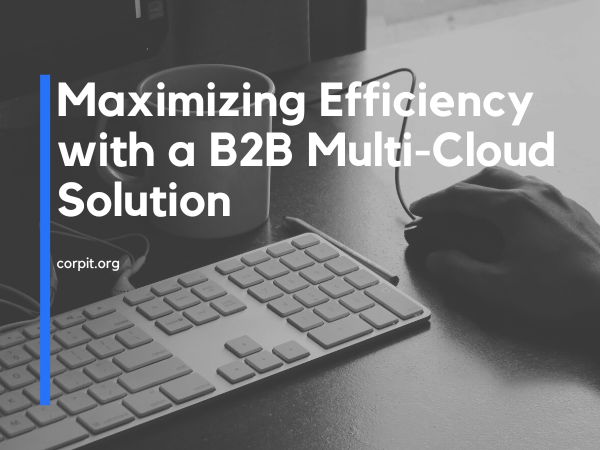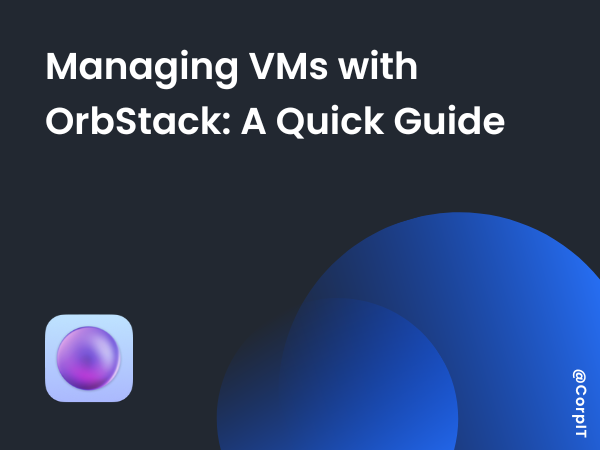In today’s digital age, businesses rely heavily on technology to operate and compete. The use of cloud computing has become increasingly popular for businesses of all sizes, as it allows for easy access to resources and data from anywhere in the world. However, many businesses have found that relying on a single cloud provider can limit their options and increase their risk. Multi-cloud is a solution that allows businesses to use multiple cloud providers and services, giving them more flexibility and control over their operations.

B2B, or business-to-business, is another important aspect of modern business. B2B transactions refer to the sale of goods or services between companies, rather than to individual consumers. B2B transactions are crucial for many industries, as they make up a large portion of the global economy.
A B2B multi-cloud solution can be an ideal way for companies to maximize efficiency by integrating and coordinating multiple cloud services, and also it helps in improving data management and security, simplifying scaling and maintenance, and increasing flexibility and cost savings. This article will explore the benefits and challenges of a B2B multi-cloud solution and provide recommendations for businesses looking to implement one.
Table of Contents
Challenges of Managing Multiple Clouds

- Lack of integration and coordination between different clouds can lead to inefficiencies and delays.
- Difficulty in data management and security with data spread across multiple clouds, increasing the risk of data breaches and loss of sensitive information.
- Scaling and maintaining multiple cloud environments can be complex and time-consuming, with different requirements for each cloud provider and service.
- Managing and backing up data across multiple clouds can be complex and difficult.
- Keeping track of costs and usage across multiple clouds can be difficult, making it harder to stay within budget and avoid overspending.
- Coordination between different teams and departments can also become a challenge, as they may be working with different cloud providers and services.
Benefits of a B2B Multi-Cloud Solution

Benefits of a B2B Multi-Cloud Solution:
- Improved integration and coordination: By using multiple cloud providers and services, businesses can better integrate and coordinate their operations. This can lead to improved efficiency and faster access to data and resources.
- Enhanced data management and security: By spreading data across multiple clouds, businesses can better protect it from potential breaches and loss. This can also make it easier to manage and back up data.
- Simplified scaling and maintenance: With a B2B multi-cloud solution, businesses can better scale and maintain their operations, as each cloud provider and service can be tailored to the specific needs of the business.
- Increased flexibility and cost savings: A B2B multi-cloud solution can also increase flexibility for businesses, allowing them to switch between different cloud providers and services as needed. This can also lead to cost savings, as businesses can choose the most cost-effective option for each task.
Implementation of a B2B Multi-Cloud Solution
A B2B multi-cloud solution can provide significant benefits for businesses, but it’s important to approach implementation in a strategic and methodical manner.

The following are key steps to take when implementing a B2B multi-cloud solution:
- Choosing the right vendor: The first step in implementing a B2B multi-cloud solution is choosing the right vendors. This includes researching and comparing different options, as well as considering factors such as cost, reliability, and scalability. It’s important to select vendors that can meet the specific needs of the business and provide the level of support and service required.
- Developing a clear strategy and plan: Once the vendors have been selected, it’s important to develop a clear strategy and plan for implementing the solution. This includes determining the specific goals and objectives for the solution, as well as outlining the steps that need to be taken to achieve them. It’s also important to identify potential obstacles and develop a plan for addressing them.
- Training and educating employees: Another crucial step in implementing a B2B multi-cloud solution is training and educating employees. This includes not only training on the specific tools and technologies being used but also educating employees on the overall strategy and goals of the solution. This will ensure that employees are able to effectively use and maintain the solution.
- Continuously monitoring and optimizing the solution: Once the B2B multi-cloud solution is implemented, it’s important to continuously monitor and optimize it. This includes monitoring the performance of the solution, identifying any issues, and making necessary adjustments. It’s also important to stay current on the latest developments in multi-cloud and make updates as needed.
Implementing a B2B multi-cloud solution can be a complex and time-consuming process, but by following these steps, businesses can ensure a successful implementation and maximize the benefits of the solution.
Conclusion
A B2B multi-cloud solution can provide significant benefits for businesses looking to maximize efficiency and protect their operations. By using multiple cloud providers and services, businesses can improve integration and coordination, enhance data management and security, simplify scaling and maintenance, and increase flexibility and cost savings. However, implementing a B2B multi-cloud solution can also present challenges, including a lack of integration and coordination, difficulty in data management and security, and the complexity of scaling and maintaining multiple cloud environments.
It’s important for businesses to weigh the benefits against the challenges before implementing a B2B multi-cloud solution. Choosing the right vendors, developing a clear strategy and plan, training and educating employees, and continuously monitoring and optimizing the solution are key steps to take for a successful implementation.
In conclusion, a B2B multi-cloud solution can be a powerful tool for maximizing efficiency in today’s business landscape. With the right implementation and ongoing monitoring, businesses can improve their operations and better compete in today’s fast-paced digital economy. It’s recommended that businesses should consider a B2B multi-cloud solution as a part of their digital transformation strategy to stay ahead of the competition.
FAQ
What is a B2B multi-cloud solution?
A B2B multi-cloud solution is a way for businesses to use multiple cloud providers and services in order to improve efficiency and flexibility. This can include using different providers for different tasks, or using a combination of private and public clouds.
Why is a B2B multi-cloud solution important?
A B2B multi-cloud solution can help businesses improve integration and coordination, enhance data management and security, simplify scaling and maintenance, and increase flexibility and cost savings. Additionally, it can reduce the risk of vendor lock-in and provide more options for meeting the specific needs of the business.
What are some of the challenges of implementing a B2B multi-cloud solution?
Some of the challenges of implementing a B2B multi-cloud solution include lack of integration and coordination, difficulty in data management and security, and complexity of scaling and maintaining multiple cloud environments.
How can businesses implement a B2B multi-cloud solution successfully?
Successful implementation of a B2B multi-cloud solution includes choosing the right vendors, developing a clear strategy and plan, training and educating employees, and continuously monitoring and optimizing the solution.
What are the benefits of a B2B multi-cloud solution?
The benefits of a B2B multi-cloud solution include improved integration and coordination, enhanced data management and security, simplified scaling and maintenance, and increased flexibility and cost savings.
How can a B2B multi-cloud solution be integrated into a company’s digital transformation strategy?
A B2B multi-cloud solution can be integrated into a company’s digital transformation strategy by identifying the specific goals and objectives for the solution and aligning them with the overall digital transformation goals. Additionally, it’s important to identify the potential obstacles and develop a plan for addressing them. Continuously monitoring and optimizing the solution can also be part of the strategy to stay current with the latest developments in multi-cloud and make updates as needed.









